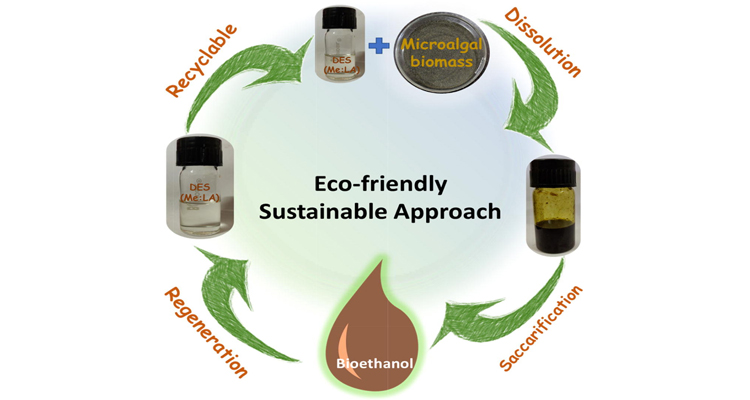 Dr Imran Pancha, Assistant Professor in the Department of Biological Sciences, has recently published a paper titled “Deep eutectic solvents and Ionic liquid assisted hydrolysis of microalgal biomass: A promising approach towards sustainable biofuel production” in the celebrated Journal of Molecular Liquids (2021): 116264 (Impact Factor-5.065). The study was conducted in association with Akshay Kulshrestha, Sandhya Mishra, and Arvind Kumar from CSIR-CSMCRI
Dr Imran Pancha, Assistant Professor in the Department of Biological Sciences, has recently published a paper titled “Deep eutectic solvents and Ionic liquid assisted hydrolysis of microalgal biomass: A promising approach towards sustainable biofuel production” in the celebrated Journal of Molecular Liquids (2021): 116264 (Impact Factor-5.065). The study was conducted in association with Akshay Kulshrestha, Sandhya Mishra, and Arvind Kumar from CSIR-CSMCRI
Microalgae is recently considered one of the promising biomasses for the production of renewable energy such as biodiesel and bioethanol. Microalgae are tiny photosynthetic organisms that utilise atmospheric CO2, water and sunlight to produce carbohydrates and lipids, which can be converted into renewable fuels. Compared to higher plants, microalgae is a good platform for bioethanol production as they do not contain any lignin in their cell composition, which makes pre-treatment for biomass hydrolysis easy. In the present study, Dr Pancha and his team explored the use of green solvents ionic liquids (ILs) and deep eutectic solvents (DESs) for microalgal hydrolysis. They observed that among the eight tested ionic liquids, ethyl ammonium nitrate (EAN) resulted in the highest saccharification yield of 95.5%. Whereas, among hydrophobic deep eutectic solvents, menthol: lactic acid (Me: LA) exhibited the highest saccharification yield of 85.7% and also did not require any additional high temperature or other pre-treatments for biomass hydrolysis, indicating as the potential solvent system for microalgal biomass hydrolysis. Overall, the present study results indicated that the identified IL and DES could be used as a green and sustainable alternative for the pre-treatment of microalgal biomass for bioethanol production.
Due to limited fossil fuel reserve as well as environmental issues like high greenhouse gas emission and other environmental problems, finding green and sustainable energy resource is of prime importance for today’s world. To solve this problem, microalgae are among the best resources for producing renewable resources due to it’s high growth rate and photosynthetic ability. Microalgae also have the ability to obtain nutrients from various wastewater, so they also do not require fresh water for cultivation. However, commercial-scale production of microalgae-based biofuels faces various problems such as cultivation cost, downstream processing for biofuel production etc. In this regard, in the present work, Dr Pancha demonstrated the use of ILs and DESs for pre-treatment of microalgal biomass for reducing sugar production, which can be further utilised to produce bioethanol.
Dr Pancha and his research group are further devoted to understanding the molecular mechanism behind the accumulation of energy reserved compounds in the microalgae and developing a sustainable biorefinery process to extract biofuels and other industrially relevant compounds from single microalgal biomass.
Read the full paper: https://doi.org/10.1016/j.molliq.2021.116264

